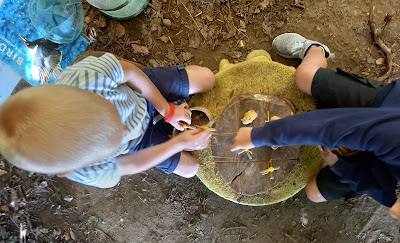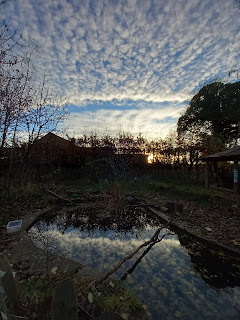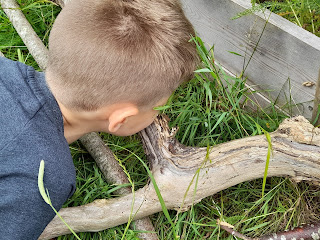Motivation
It's really hard to concisely explain the benefits of Forest School because there is no short answer.
We see children engage in a way they may not in the classroom. We watch their confidence and self-esteem blossom. We help them learn to risk assess and take responsibility for their own safety. We foster their curiosity, help them find information, and follow their interests. We see them adapt, grow, learn, investigate, explore, and develop a positive attitude to learning...
The lack of a Forest School Curriculum is its strength, but in a world of data collecting the holistic, cooperative process between the adults and the children can struggle to prove itself on paper. Observation, reflection and communication are common in the EYFS, but even then are set against specific outcomes. The unique development of each child cannot fit into such a system. Forest School is all about process and not product!
Giving children the opportunity, time and space to reflect, vent, explore, and understand how they feel feeds into emotional development, wellbeing, positive mental health, and emotional intelligence.
It always amazes me how well the children resolve issues when they are in Forest School. Anyone who has spent time doing playground duty knows there are days when you feel you've spent an hour policing behaviour and following up on complaints! Yet in Forest School I see children discuss, communicate, argue, and move on, without looking for adult intervention.
Of course, this is mostly because I love eavesdropping on their conversations! It's easy to pick up when voices become raised, but standing back and waiting nonchalantly usually spurs them on to work out their issues between themselves.
Both their relationship with peers and their own self-regulation is exercised and tested regularly!
This actually helps build those relationships positively, not just with friends but with all classmates. Children who do not usually play together frequently share spaces, activities, and interests outdoors that they don't inside.
They widen their experiences together, as a group, sharing experiences and space. They problem-solve, build resilience trying new things over and over, and gain a sense of achievement when they succeed, as well as cope with and learn from their failures.
They help and encourage each other, suggest and collaborate, and cooperate with small and large groups. This extension of their social development, beyond usual class dynamics and friendship groups, helps the individual child understand themselves better as well as those around them.
The children bring their own knowledge to Forest School with them, information they want to share with adults and peers, in context but within situations that randomly arise. Their excitement at contributing and imparting something new takes courage for some, allows everyone's vocabulary to expand and their communication skills to grow, it can give a sense of empowerment, create a thirst to know more and open new perspectives for those with no prior knowledge. Working together encourages an expression of thoughts and ideas, as well as the ability to listen to others.
Physically the sessions provide endless opportunities for both fine motor skills and gross motor skills to develop. Outdoors the scope is often wider, with the chance to successfully collect a minute bug a constant alongside climbing a sprawling Sycamore tree. Learning to embrace the rain and wind, to deal with the demands of heat, to pace yourself, build stamina, and seeing it all as a positive experience also fosters a sense of the wider world around us. Physically being in wide-open natural spaces, feeling a connection to it, and recognising we are all a part of something bigger than ourselves is something that being in a classroom struggles to achieve.
So how do we condense all these learning opportunities into a simple description of what Forest School provides?
I think for me I'll settle on 'Motivation'.
Motivation to join in.
Motivation to explore.
Motivation to contribute.
Motivation to get along.
Motivation to communicate.
Motivation to learn.
It will never fit onto a sheet of data - but it's essential in life.









Wonderful
ReplyDelete